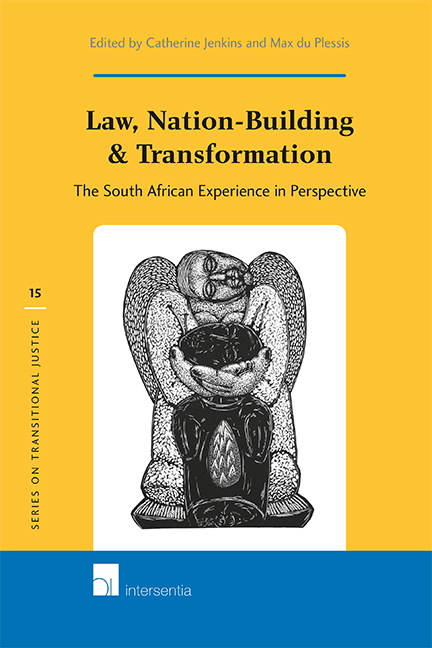Book contents
- Frontmatter
- Editors’ Foreword
- Contents
- Chapter 1 Transitional Justice: Lessons from South Africa?
- Chapter 2 Reflections on Post-Apartheid Nation-Building: Identity, Participation, Community
- Chapter 3 The Truth and Reconciliation Commission Process: A Retrospective
- Chapter 4 Rights at Work: The Transition to Constitutional Democracy and Women in South Africa
- Chapter 5 Crime, Policing and Nation-Building
- Chapter 6 Public Schools for Afrikaners in South Africa
- Chapter 7 Behind the Mask of the Rainbow Nation: The Limits of Law in Post-Apartheid South Africa
- Chapter 8 The Transformation of the Judiciary
- Chapter 9 Assessing the Social Transformation Performance of the South African Constitutional Court: From Totalitarianism to the Rule of Law
- Chapter 10 The Transformation of Land Law
- Chapter 11 The South African Presidency in Comparative African Context
- Chapter 12 Aspects of the Treatment of Freedom of Expression in South Africa’s Democratic Transition
- Chapter 13 Constitutionalism in Commonwealth Africa: Comparative Perspectives
Chapter 6 - Public Schools for Afrikaners in South Africa
Published online by Cambridge University Press: 16 December 2020
- Frontmatter
- Editors’ Foreword
- Contents
- Chapter 1 Transitional Justice: Lessons from South Africa?
- Chapter 2 Reflections on Post-Apartheid Nation-Building: Identity, Participation, Community
- Chapter 3 The Truth and Reconciliation Commission Process: A Retrospective
- Chapter 4 Rights at Work: The Transition to Constitutional Democracy and Women in South Africa
- Chapter 5 Crime, Policing and Nation-Building
- Chapter 6 Public Schools for Afrikaners in South Africa
- Chapter 7 Behind the Mask of the Rainbow Nation: The Limits of Law in Post-Apartheid South Africa
- Chapter 8 The Transformation of the Judiciary
- Chapter 9 Assessing the Social Transformation Performance of the South African Constitutional Court: From Totalitarianism to the Rule of Law
- Chapter 10 The Transformation of Land Law
- Chapter 11 The South African Presidency in Comparative African Context
- Chapter 12 Aspects of the Treatment of Freedom of Expression in South Africa’s Democratic Transition
- Chapter 13 Constitutionalism in Commonwealth Africa: Comparative Perspectives
Summary
INTRODUCTION
Now, many years after the South African Constitutional Assembly adopted the Constitution, it is difficult to recall just how difficult the settlement on the language of instruction in education was. Today, language issues are overshadowed by the problems of establishing democratic ways of acting and mitigating inequality. But, at the time of negotiating the 1996 Constitution, the demand of Afrikaners for the protection of Afrikaans commanded attention because the support of the Afrikaner-based outgoing National Party (NP) government was necessary for both formal reasons – the African National Congress (ANC) did not have the two-thirds majority required for the adoption of a new Constitution – and substantive ones – if Afrikaners were not brought on board, a real danger existed that they would actively seek to destabilize the new democracy.
Of course, in a multilingual country like South Africa, a claim for the protection of a language need not be controversial – conceding some languageclaims can strengthen, rather than undermine, the political order. But the use and state protection of Afrikaans had been highly politicized in South Africa for decades. Agreement that Dutch should have the same status as English as an official language was central to the achievement of Union in 1910, when the two former Dutch or Afrikaans-speaking Boer Republics were united with the two British colonies to create a single country. By the time the National Party won power in 1948, Afrikaner nationalists had articulated an exclusive vision of Afrikaner identity of which single-medium schools were a pillar. Through the apartheid years and against the expectations of many observers, Afrikaans consolidated its position as a public language, but it remained widely perceived as the language of apartheid ideology. As Giliomee comments, ‘Afrikaans, the Afrikaner policy of apartheid and the Afrikaner-controlled state had become locked in a tight and suffocating embrace. Afrikaans had become the language of the oppressor – the medium used when white policemen arrested black pass offenders or when white civil servants ordered blacks or colored people out of their houses in racially mixed slum areas.’ In the 1970s, apparently once again concerned about the survival of Afrikaans, the apartheid government instituted a requirement that black students be taught in both English and Afrikaans.
- Type
- Chapter
- Information
- Law, Nation-Building and TransformationThe South African Experience in Perspective, pp. 139 - 168Publisher: IntersentiaPrint publication year: 2014



